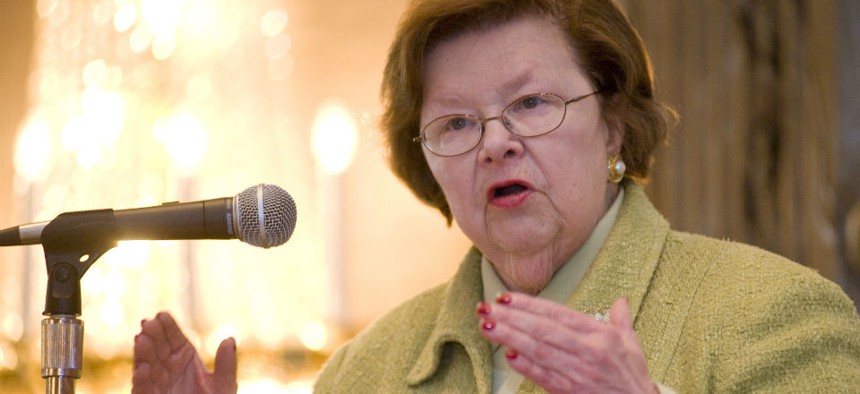
Sen. Barbara Mikulski, D-Md., defended federal employees during a hearing on the Obama administration's request for more Ebola funding. Bill Hrybyk/Goddard Space Flight Center file photo
Senator: Good Federal Employees Can’t Be Ordered on Amazon
Lawmaker wants respect and resources for the federal workforce.
Good federal employees cannot be mail ordered.
That was the closing argument from Sen. Barbara Mikulski, D-Md., the outgoing chairwoman of the Senate Appropriations Committee, at a hearing Wednesday to discuss a White House request for $6.2 billion in emergency funding to aid the fight against Ebola.
“We need to have a civil service that is reliable,” Mikulski said. “We can’t order it at Amazon.com.”
She went on to say lawmakers need to show they “respect” the federal service, which could be demonstrated by granting President Obama’s funding request.
“Just one year ago they were told they were not essential,” Mikulski said, referring to the 2013 government shutdown. “Now we’re asking them to risk their lives.”
Hundreds of civilian federal employees from the Centers for Disease Control and Prevention; National Institutes of Health; and State, Defense and Health and Human Services departments have been deployed to West Africa to fight the spread of Ebola, in addition to military personnel in the region. Unlike many in Congress, those workers are not taking “lavish trips,” but instead going to severely infected countries, Mikulski said.
Citing Obama’s funding request for Ebola and, more generally, tightened budgets due to sequestration, Mikulski said lawmakers must give federal employees “the resources they need” to do their work.
“We need to do our job so they have what they need to do their job,” she said.
Administration officials repeatedly stressed the need to approve the funding request to continue and expand their work to curb the spread of the deadly virus.
Lawmakers at the hearing asked witnesses from federal agencies involved in the U.S. government Ebola response effort why military personnel returning from West Africa undergo mandatory quarantine upon their return, but the same is not requested of civilians. Defense and other agency officials said the military decision is an “operational” one, while the non-quarantine for civilians is a scientific decision based on “stratification of risk.”







